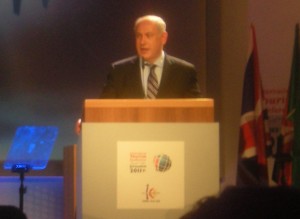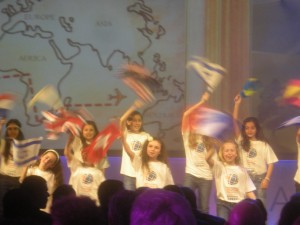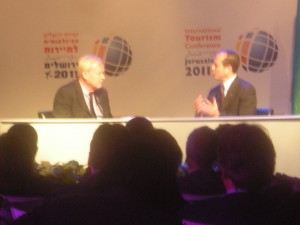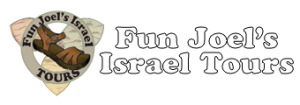
This week I am attending the first International Tourism Conference being held in Jerusalem’s Binyanei HaUmah Convention Center. Focusing both on the changing opportunities and challenges in the global tourism industry, as well as on the unique attractions of Israel (and Jerusalem in particular) as a tourist destination, the conference has drawn hundreds of participants from around the world.
With panels on topics such as “The Role of Media in Generating Tourism,” “The Impact of Technology on the Tourism Industry,” and “Branding Cities,” the conference features politicians such as Prime Minister Binyamin Netanyahu, Minister of Tourism Stas Misezhnikov and Jerusalem Mayor Nir Barkat alongside media personality Chris Matthews (“Hardball with Chris Matthews”), MTV International founder Bill Roedy and museum directors from around the world.
Before I get into summarizing individual sessions, a few observations are in order.
Overall, I think the conference has been well organized and produced. They have put a lot of money into the event, everyone feels comfortable, panelists are generally well chosen, and the topics are fairly diverse and interesting. If I had any criticisms, my main concern would be that the conference seems to be unclear about defining its purpose. Its slogan (which I dislike due to its redundancy, despite the fact that I understand it) is “Tourism in a Global World.” And many of the panels focus on just this topic. But at the same time, a number of the speakers have focused specifically on publicizing Israel and Jerusalem, almost “pitching” it to the global tourism community.
Clearly, promoting Jerusalem and Israel is the underlying purpose for running an event of this nature here and now. But I believe that simply holding the event here accomplishes that goal by itself. The blatant promotion seems a bit out of place when the slogan is about globalism in the tourist industry. I wonder if overseas visitors will feel they have been given a product that differs from what was promised by the conference’s tag line.
Beyond that, however, the opening ceremony and first day of panels have been solid, and I look forward to Thursdays sessions as well. A little on each session so far…
Opening Event
The night began with heavy security, due to the appearance of the Prime Minister. As much as I am used to security in Israel, it did seem a drop heavy-handed on Tuesday night. This seemed to be what some of the panelists the following day were referencing when they said you need to walk the fine line between providing enough security so tourists feel safe and providing so much that it becomes obtrusive and annoying.
Once inside, we found a lovely reception with delicious food and open bar. Once everyone had gotten inside, everyone filed into the main hall, seating themselves at tables — a nice touch that made it feel less like a traditional conference and more like an awards ceremony.
Setting the tone right away, the event opened with a short video that stressed how technology and the Internet are bringing us all closer together. (For anyone reading this who is on Twitter, a couple of us have used the hashtag #ITCJeru for tweets on the subject.) This was followed by a cute performance by a group of little girls singing “It’s a Small World” translated into Hebrew.

The host for the evening was Israeli actor and TV personality Eden Harel. Internationally renowned music and dance troupe Mayumana provided entertainment, including a selection from their popular piece “Momentum.”
The first speakers were Misezhnikov and then Netanyahu. Speaking in Hebrew (simultaneous translation via headphones was provided for those who needed it) Misezhnikov referred to Jerusalem as Israel’s “#1 brand” and stressed the city’s history and culture as a draw for “cultural tourism.”
Bibi (as Netanyahu is popularly known) spoke in English and described both why we need tourists to come here and what we have to offer to the global tourist community. Despite record tourist numbers last year, he said it is still not enough. “Israel should have more tourists than people,” he said, stressing that instead of a 1:2 ratio of tourists to people, we need more of a 1:1 ratio.
He stressed the high-tech nature of our economy, and the unique cultural and religious offerings available here. Israel is the only place on Earth, he said, where “if you place a call to God it is a local call.” It is a real “Bible Land” in contrast to those pitched by American televangelists. We were sitting, he pointed out, about 400 meters from the birthplace of John the Baptist, in the nearby Ein Karem neighborhood. Focusing on the Christian market, he said that to drive tourism to the Christian sites in the Galilee we should have direct flights there, though it was unclear how he meant this, since there are no plans (to my knowledge) to build another airport there at the moment!
Until recently, Netanyahu continued, he would have told you to go to Tel Aviv to see how fun a country we are as well. While many European cities are shutting down by 11 or 12 at night, Tel Aviv doesn’t even get going until 2 or 3 AM. “Until recently,” he pointed out, because now you can find the same thing in Jerusalem.
He ended by saying, “All I can ask of you is: come often, and bring your friends, and tell them about it.”
Here is a video of Netanyahu’s full speech:
The evening continued with Chris Matthews first speaking alone, then interviewing Jerusalem Mayor Nir Barkat. He described the unique love for Israel he developed on his first trip here 40 years ago, following a stint working in Africa. “Almost everyone has Israel somewhere in their hearts,” he said, describing an inexplicable, universal feeling. But he stressed that no one can tell you what it is like to come to Jerusalem; you need to feel it for yourself. Quoting what he described as a cult film, he concluded, “I’ve learned that people only truly believe what they learn for themselves.”
Barkat then responded to Matthews’ questions about how to attract tourists to Jerusalem in a climate of tension. He began by saying that the fact is that Jerusalem is actually a very safe city. People want to come here and we need to make their stay pleasant to turn them into “cultural ambassadors.” Jerusalem is not just for its residents, he said, stressing his desire to turn it into an “international open city” for the world to enjoy. More than once he said the city must “fanatically maintain freedom of religion” for all, allowing everyone to enjoy any part of Jerusalem in their own way, with respect.

Other speakers included Ambassador Dr. Zoltan Somogyi of the World Tourism Organization, Moshe Lion of the Jerusalem Development Authority and Ami Federman of the Israeli Hotels Association and Dan Hotel chain.
But the other highlight of the evening for me was a warm and enjoyable speech by Roedy. He spoke fondly of Harel saying that she is still his favorite veejay from her days on MTV Europe. He was born within a month of the birth of the State of Israel, in June 1948 and made his first visit here after the 1973 Yom Kippur War. Coming out of the Vietnam War, he looked on Israel as a “beacon of democracy.” And while his friends celebrated the U.S. Bicentennial in 1976, he was more riveted by the famous hostage rescue at Entebbe.
He has traveled literally all over the world, and when people ask his favorite place, Roedy has a list of his top 25 cities that he tells them. But he said that while some may shift, his #1 city always remains the same: Jerusalem. “Jerusalem is a source of cool,” he said.
He got a good laugh when describing some of what Israel has to offer: “Floating in the Dead Sea. Diving in the Red Sea. Don’t reverse the two!”
Finally, however, he stressed the need to connect with young travelers. They are less affected, he said, by political turmoil and bad press. Through significant market research, he said he found that young people say their second most fulfilling experience was encountering new cultures through travel. Their most prized competition win was a holiday, which was also the main place they spend their money. And 8 of 10 said they would travel for a festival or music event.
Roedy also showed some videos stressing an MTV Travel campaign that brought a high profile to tourism in Estonia and in Malta. All I could think was when will Roedy bring one of these festivals to the country he says he loves so much: Israel?
My next post on the Conference will cover the first full day of panels, Wednesday. I’ll post a separate entry on the final day and its panels.

Love your blog fun Joel!
Thanks! Did you pass the exam, by the way?
Stay tuned for part 2 and 3 of this post, soon! 🙂
There was a free bar!!! I should have gone.
This is a good blog man, I demand more posts!
Thanks! Lots of posts since this one! 😉